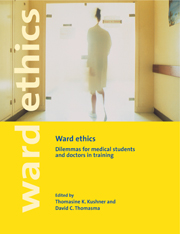Book contents
- Frontmatter
- Contents
- Acknowledgments
- List of contributors
- Prologue. Breaking the silence
- Letter from a young doctor
- Part I On caring for patients
- Section 2 Problems in truth-telling
- Section 3 Setting boundaries
- Part II On becoming a “team player”: searching for esprit de corps and conflicts of socialization
- Section 5 Argot, jargon, and questionable humor: assuming the mantle at the patient's expense
- 15 Comedians: mordant humor and cynicism
- 16 What's in a name? Derogatory references
- Section 6 Making waves: questioning authority and the status quo
- Section 7 Perceiving misconduct and whistle-blowing: observing peers or superiors commit an act deemed unethical
- Epilogue: Using this book
- Glossary
- Index
15 - Comedians: mordant humor and cynicism
Published online by Cambridge University Press: 05 February 2015
- Frontmatter
- Contents
- Acknowledgments
- List of contributors
- Prologue. Breaking the silence
- Letter from a young doctor
- Part I On caring for patients
- Section 2 Problems in truth-telling
- Section 3 Setting boundaries
- Part II On becoming a “team player”: searching for esprit de corps and conflicts of socialization
- Section 5 Argot, jargon, and questionable humor: assuming the mantle at the patient's expense
- 15 Comedians: mordant humor and cynicism
- 16 What's in a name? Derogatory references
- Section 6 Making waves: questioning authority and the status quo
- Section 7 Perceiving misconduct and whistle-blowing: observing peers or superiors commit an act deemed unethical
- Epilogue: Using this book
- Glossary
- Index
Summary
CASE
“You killed one of our patients”
On my first night on call as a third year medical student on internal medicine rotation, a 52-yearold man was brought into the hospital by his son and daughter because of lumbar and bilateral hip pain so severe he could no longer get out of bed. Two months earlier he had gone to his local Emergency Department complaining of a seizurelike episode. His doctors had diagnosed lung cancer with metastasis to his brain and he had undergone surgery to remove his brain tumor.
We began to work to alleviate the pain and performed daily musculoskeletal and neurological exams. This went on for about one week; each morning arriving early to check on the vitals and physical. One morning, strangely enough, I could not locate the man's chart. When I walked into his room, he was no longer there. I was annoyed, believing that my patient had been moved to a different floor, thus wasting my preround minutes. When I approached a nurse to ask the whereabouts of my patient, I was shocked to hear that he had passed away overnight.
I felt strange. I kept thinking about my daily exams and how pointless they had been. I felt neglected; left out. Though only a student, I felt that I should have been there with the family. As I mulled over these thoughts, our team made our way to morning report.
- Type
- Chapter
- Information
- Ward EthicsDilemmas for Medical Students and Doctors in Training, pp. 154 - 162Publisher: Cambridge University PressPrint publication year: 2001

